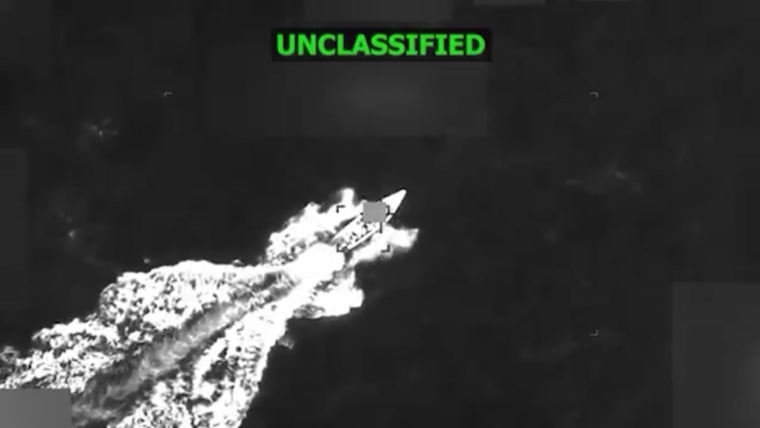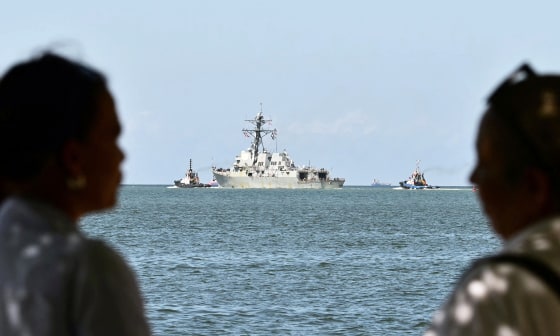The United Kingdom has stopped sharing intelligence on suspected drug smuggling boats in the Caribbean because of concerns about the legality of recent U.S. military strikes, two sources with knowledge of the matter told NBC News.
A British government spokesperson in London declined to comment directly on whether the U.K. had suspended some information-sharing with Washington.
“It is our longstanding policy to not comment on intelligence matters,” the Downing Street spokesperson said in an email. “The U.S. is our closest ally on security and intelligence. We continue to work together to uphold global peace and security, defend freedom of navigation, and respond to emerging threats.”
CNN first reported the suspension of intelligence sharing on narcotics trafficking vessels in Latin America.
The CIA declined to comment. The Pentagon did not immediately respond to a request for comment Wednesday.
Britain is America’s most important intelligence partner in a spying alliance of five English-speaking democracies known as “Five Eyes,” which also includes Australia, Canada and New Zealand.

Britain, France and the Netherlands have territories in the Caribbean and have long worked with the United States and other regional governments to try to stem narcotics trafficking. In the past decade, cocaine smuggling to Europe from South America via the Caribbean has spiked, according to government reports and experts.
Former military lawyers, legal experts and Democrats in Congress say the strikes violate international and U.S. laws that prohibit using military force to target civilians. They argue that drug gangs do not meet the legal standard of an armed group at war with the United States.
The subject of America’s military attacks on alleged drug smuggling boats came up during a meeting in Canada of foreign ministers from the Group of Seven industrialized democracies, Kaja Kallas, the European Union’s foreign affairs chief, told NBC News.
Secretary of State Marco Rubio on Wednesday denied that Britain had stopped sharing intelligence. He also said his counterparts did not raise the U.S. military campaign in Latin America and intelligence support for the operation during the discussions.
“Not with me — no one raised it,” Rubio told reporters after the meeting in Niagara-on-the-Lake, near the U.S. border.
“It didn’t come up once,” Rubio said.
He added: “Again, nothing has changed or happened that is impeded in any way our ability to do what we’re doing, nor are we asking anyone to help us with what we’re doing — in any realm. And that includes military.”
Asked about European concerns as to whether the U.S. was adhering to international law with its boat strikes, Rubio said it was up to the United States to safeguard its security.
“I don’t think that the European Union gets to determine what international law is. What they certainly don’t get to determine is how the United States defends its national security,” Rubio said.
“The United States is under attack from organized criminal, narco-terrorists in our hemisphere, and the president is responding in the defense of our country.”
Asked whether the Canadian government is withholding intelligence from Washington on narcotics trafficking in Latin America, Canada’s foreign affairs minister, Anita Anand, told reporters Wednesday: “The U.S. has made it clear it is using its own intelligence. We have no involvement in the operations you were referring to.”
Canada’s intelligence service did not immediately respond to a request for comment.
NATO allies have said little publicly about President Donald Trump’s military campaign in the Caribbean and the Pacific, which marks the first time an American commander-in-chief has treated drug smugglers as a military adversary at “war” with the United States.
On the legality of the strikes, a spokesperson for British Prime Minister Keir Starmer told reporters Tuesday: “Decisions on this are a matter for the U.S. Issues around whether or not anything is against international law is a matter for a competent international court, not for governments to determine.”
France’s foreign minister, Jean-Noel Barrot, expressed concern on Tuesday about the legal foundation for the U.S. military strikes.
“We have followed with concern the strikes carried out by the United States in international waters, in disregard of international law and the law of the sea,” Barrot told the French newspaper La Journal du Dimanche.
Barrot added that, “We cannot allow these lawless criminal networks to thrive” and that, “France does not hesitate to deploy its military assets to intercept drug traffickers’ vessels, in close cooperation with the countries concerned . . .”
The U.N. High Commissioner for Human Rights Volker Türk said last month that there is no justification for the strikes under international law.
“These attacks — and their mounting human cost — are unacceptable. The US must halt such attacks and take all measures necessary to prevent the extrajudicial killing of people aboard these boats, whatever the criminal conduct alleged against them,” Turk said in a statement.
The Trump administration, however, maintains that drug cartels pose a threat to America’s national security by transporting narcotics to the United States that claim tens of thousands of lives each year. The administration has labeled multiple cartels from Venezuela, Mexico and elsewhere as foreign terrorist organizations.
The strikes, which began in early September, have killed at least 75 people, according to numbers announced by the Pentagon.
Colombian President Gustavo Petro on Tuesday ordered his country’s security forces to stop sharing intelligence with Washington until the Trump administration halted the strikes on suspected drug traffickers in the Caribbean.
In a post on X, Petro wrote that Colombia’s military must immediately end “communications and other agreements with U.S. security agencies.”
The Trump administration has portrayed Petro as failing to crack down on narco-traffickers and criticized his decision not to extradite Colombian rebel leaders involved in the drug trade to the United States.


